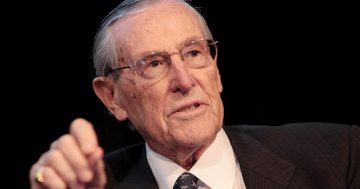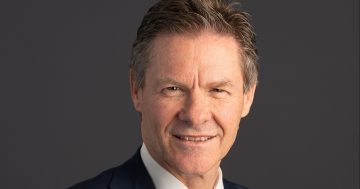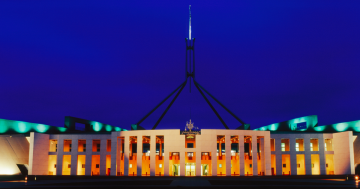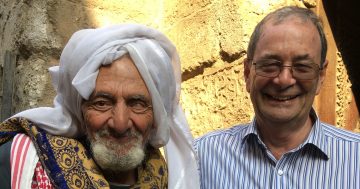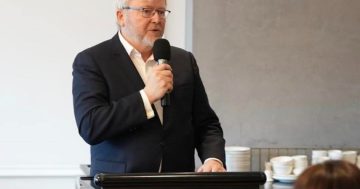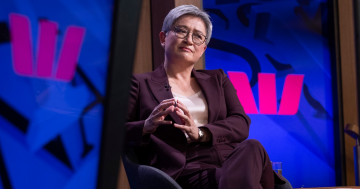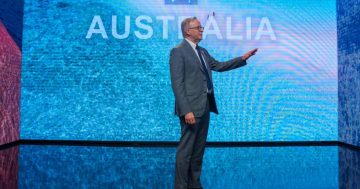
Former ambassador Richard Woolcott was widely esteemed for his diplomatic insights. Photo: University of Melbourne.
It was midway through 2005 and I was a new member of the Canberra Press Gallery, having been posted by The West Australian newspaper to cover politics and foreign affairs from the nation’s capital.
One of the very first phone calls I received in the job was from one Richard Woolcott, who had been directed to me by the newspaper’s foreign desk in Perth.
He introduced himself – “Dick Woolcott here,” – and asked if I’d be interested in some background on a trending international event.
Totally unassuming, he mildly began to explain in a quiet, raspy voice that he had some experience in diplomatic affairs but he didn’t expect me to know who he was.
Know who he was?
I had only weeks before finished reading his riveting memoir The Hot Seat: Reflections on Diplomacy from Stalin’s Death to the Bali Bombings.
I most certainly knew who he was. Didn’t everyone?
After taking down a few notes and a couple of quotes on the issue at hand, I asked if he’d be open to an interview sometime for a profile feature to appear as a weekend read in the newspaper.
He was.
He invited me around to his home in Forrest, where I met in person for the first time someone I had admired from afar for quite some time.
And so began a working relationship I found incredibly valuable for more than a decade; and a personal relationship that, while not overly familiar, quickly became something to cherish.
Woolcott died in Canberra on Thursday aged 95, and I found myself instantly missing him even though we had not been in contact with each other in the past few years.
But every phone call I made for so many years back then, if not immediately answered, was always returned and always worth it.
His knowledge of the world and Australia’s place in it was immense, as was his generosity in sharing some of that vast wisdom he had gathered from decades of representing at the highest international levels the country he so evidently loved.
Sometimes I called or visited him seeking background and/or comment for stories I was working on.
Sometimes I just called seeking inspiration.
He never disappointed.
Many times he called me offering insights on international events, or to ask if I was aware of certain things he thought I needed to know.
And occasionally he made contact seeking a little promotion for his latest project.
“Do you think you’d be interested in reviewing my latest book?” he once asked over the phone.
“Sure would,” I replied. “I’ll be right over.”
The micro drive from Parliament House across National Circuit to his home was always worth it.
On a couple of occasions, when parliament wasn’t sitting, I even took a lunchtime stroll to the house in search of some good company and a morsel of wisdom.
I would never go unannounced, and he never discussed anything he shouldn’t have, but I was always made welcome.
That particular book, Undiplomatic Activities, was a much lighter read than Hot Seat and revealed to readers Woolcott’s exceptional sense of humour as he recounted some of the more bizarre anecdotes from his long and varied career.
But I already knew how funny and naturally charming he was.
While serving in New York, he used internal memo pads with the salutation printed across the top: “While you were out f–king around …”.
He once called me to say he had an old newspaper clipping he’d like me to read and asked if he could drop it off to me somewhere.
By then I had left The West Australian and was working in the gallery for another paper.
That day, however, I was in some seminar at the swanky Realm Hotel in Barton and said I could meet him in the lobby.
He walked in at the arranged time all suited up and with a newspaper under his arm.
We shook hands and before we sat down on the plush lounge chairs, he looked around the walls and said with a smile: “The Realm. It’s not a bad pub, this one.”
Ours wasn’t a close and chummy friendship by any means, but it was always enjoyably friendly and it wasn’t always about work.
At times he shared snippets of personal things – about his pride in his children, about the house he bought for such a good price way back when, about his wife Birgit’s struggle with cancer and her passing in 2008, and his subsequent relocation to Sydney.
But I never called him Dick, even though he referred to himself that way.
I left that for those who knew him far better than I did.
I always called him Richard.
I once confided in him that listening to him made me wish I had chosen diplomacy over journalism as my career, to which he answered: “We’re doing the same thing really. We’re both about getting to the truth.”
His willingness to be of assistance always impressed me.
Once, while travelling on holiday to parts of Asia, I arrived at my Hong Kong hotel to find a note from Australia’s embassy there saying I was welcome to drop by and receive a briefing on the mission’s work.
“Mr Woolcott has recommended it,” the note said.
He had arranged for a similar briefing in Beijing as well.
The timing allowed me to accept the Beijing offer and I found the briefing of great benefit.
But I also discovered how highly regarded the former DFAT secretary remained among Australia’s diplomatic network even after so many years in retirement.
Upon his retirement in 1992, the then foreign minister Gareth Evans delivered a glowing and fitting speech at a dinner in Woolcott’s honour.
“Whenever I think about Dick Woolcott – and that is rather a lot lately, because I keep reading about him in the newspapers – it is as one of a very select group of people, those who have become role models for an entire genus,” Evans said.
“There are others in this pantheon – Mandrake the Magician, for example, Attila the Hun, Conan the Barbarian, Louis the Fly – but right up there with them is Dick the Diplomat: the very model of the model professional.”
Woolcott was so professional that both sides of Australian politics trusted him and sought his expert advice.
He had the ear of every prime minister since Harold Holt until only in very recent years when his health began to fail.
(Even before Holt, Woolcott accompanied Robert Menzies on overseas trips as a very junior public servant.)
He advised Gough Whitlam and Malcolm Fraser over East Timor – quite controversially, as it turned out.
He had ambassadorships to Indonesia, the Philippines, the United Nations and more. He was president of the United Nations Security Council.
And as Australia’s most senior diplomat, he ensured that the marriage of two formerly separate agencies became the highly embraced and successful Department of Foreign Affairs and Trade.
Woolcott helped shape the original Asia Pacific Economic Forum under the directions of Bob Hawke and Paul Keating.
Kevin Rudd even enticed him out of retirement in 2008 (not that he’d ever really left the scene) to explore, as a special government envoy, the appetite for a new Asia-Pacific regional forum.
All these things have been written about at length over many years and decades, with some eloquent reminders since his passing of just how immense and influential Woolcott’s service to Australia was.
This contribution of mine merely seeks to give some small insight into the personality and character of a true diplomatic giant who also happened to be a highly decent, top bloke.












